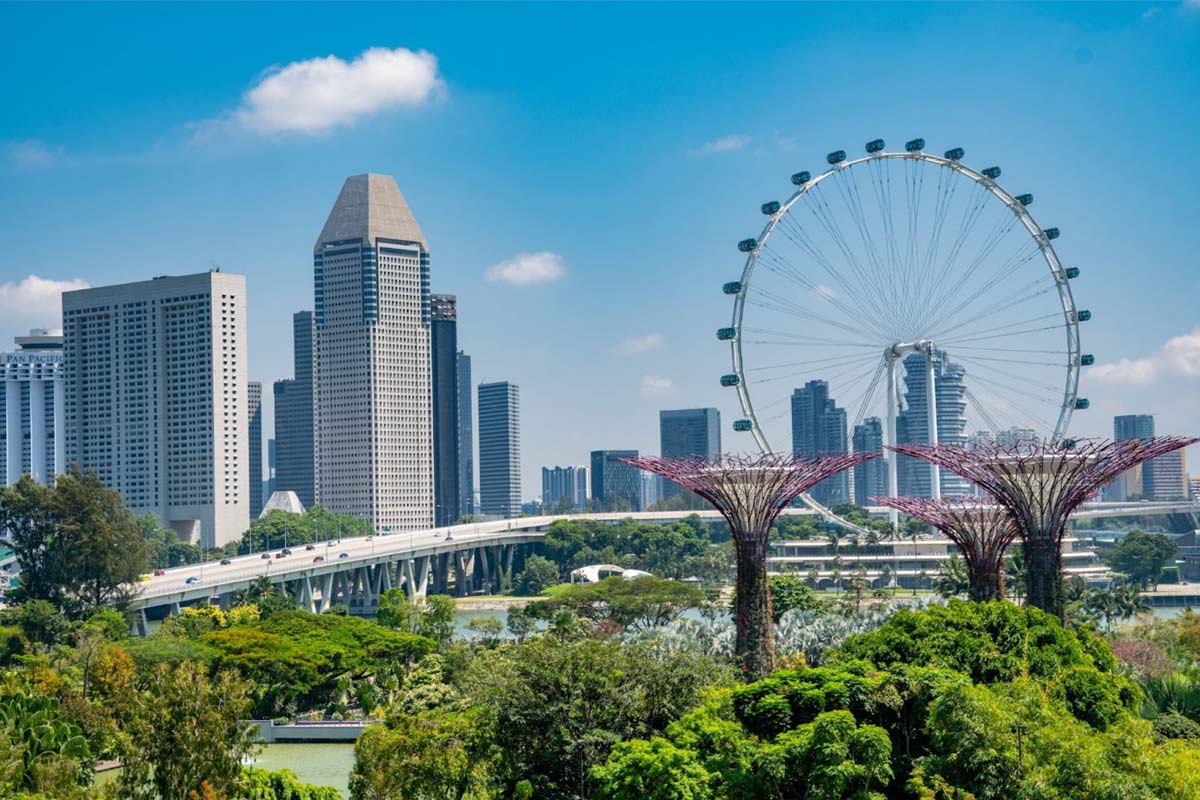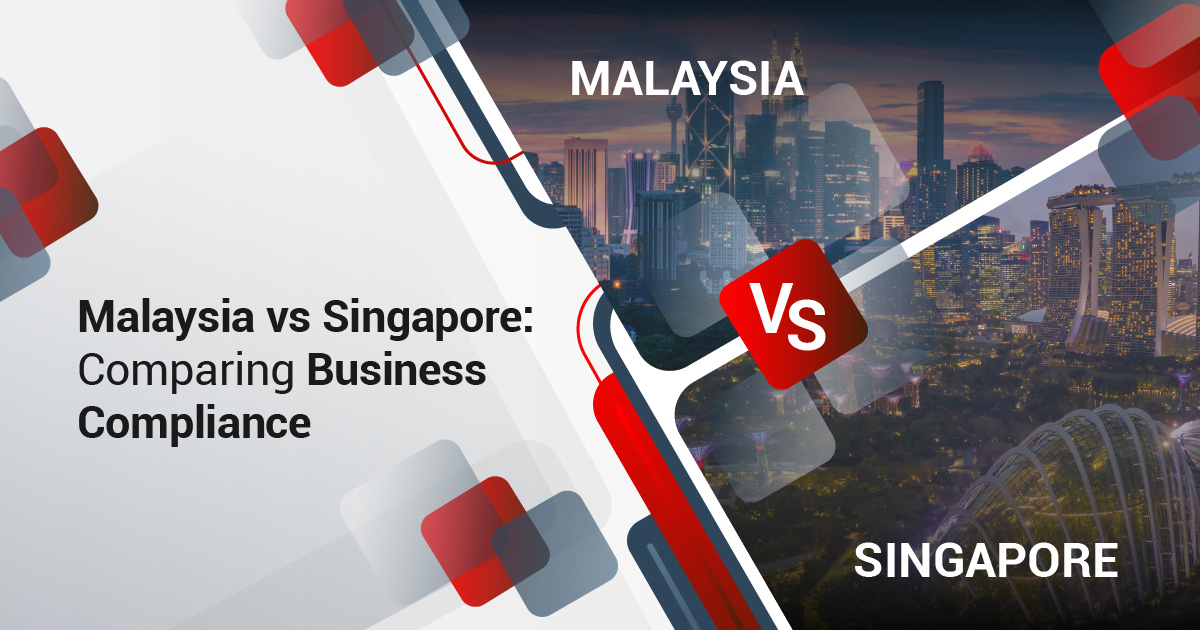Choosing the right jurisdiction for your business expansion can determine whether your company thrives or struggles under regulatory burden. For foreign investors eyeing Southeast Asia’s on-the-rise markets, Malaysia and Singapore emerge as the two frontrunners, each offering distinct advantages that could save (or cost) your organisation significant time and resources.
For those unfamiliar with Southeast Asian diversity, corporate secretarial compliance requirements in these countries might be assumed to be similar, yet the marked differences impact your daily operations, cash flow, and strategic flexibility. Your jurisdiction choice influences everything from launch speed to quarterly administrative overhead.
Malaysia offers compelling cost advantages and domestic market access, governed by the modernised Companies Act 2016. The framework operates through specialised regulatory agencies, enabling deep sector expertise while requiring businesses to interact with multiple authorities. Foreign-owned businesses benefit from accessible legal thresholds, though practical capital requirements vary by industry and licensing needs.
Singapore emphasises efficiency and regulatory predictability through the Accounting and Corporate Regulatory Authority (ACRA), which consolidates corporate functions into a unified digital platform. This centralised approach simplifies compliance interactions, though businesses face higher operational costs compared to regional alternatives.
Of course, the story goes deeper, depending on your scenario. This analysis examines regulatory architecture, incorporation processes, capital requirements, and ongoing compliance obligations. Understanding these differences provides the insight needed for informed decisions aligning with your business objectives and growth timeline.
Key Takeaways
- Malaysia operates through multiple specialised agencies, offering deep sector expertise but requiring businesses to manage relationships with various authorities while Singapore provides centralised regulatory frameworks under ACRA with a unified digital platform (BizFile+), simplifying compliance interactions.
- In Malaysia, compliance deadlines are tied to the company’s date of incorporation and FYE in Singapore, allowing for coordinated compliance.
- Incorporation in Malaysia takes 5-10 working days, with optional company constitutions and specific resident director requirements, while incorporation is faster (1-2 working days) with flexible resident director options and mandatory company constitutions in Singapore.
- Professional corporate secretarial services streamline compliance, reduce administrative burdens, and provide strategic advantages for businesses operating in one or both jurisdictions.
Malaysia vs Singapore’s Regulatory Architecture: Unified vs. Multi-Agency Structures
Malaysia’s Multi-Agency Framework
Malaysia’s corporate oversight operates through distinct specialised bodies, each wielding authority over specific business sectors. The Companies Commission of Malaysia (SSM) handles company formations and corporate law compliance under the Companies Act 2016.
Public companies and capital markets fall under the Securities Commission Malaysia (SC), which enforces the Malaysian Code on Corporate Governance beyond statutory minimums. Bank Negara Malaysia (BNM) regulates financial institutions while administering anti-money laundering frameworks. The Inland Revenue Board of Malaysia (LHDN) collects direct taxes through separate processes.
This structure creates deep and specific sector knowledge within each agency. Foreign investors benefit from specialised expertise but must manage relationships with multiple authorities. Each body operates independent systems, requiring businesses to track different deadlines, forms, and compliance requirements across agencies.
Singapore’s Centralised Model

Singapore consolidates corporate functions under the Accounting and Corporate Regulatory Authority (ACRA), formed in 2004 by merging the Registry of Companies with the Public Accountants’ Board. ACRA administers the Companies Act, Business Names Registration Act, and Limited Liability Partnerships Act through a single authority structure.
The BizFile+ portal serves as ACRA’s digital backbone, simplifying processing registrations, filings, and information requests through integrated systems. Companies interact primarily with one regulator for most compliance needs, from incorporation through annual filings. This concentration allows ACRA to develop sophisticated digital processes that connect different regulatory functions, though businesses sacrifice the specialised sector knowledge that separate agencies might provide.
Incorporation Experience: Speed and Accessibility
Malaysia’s Incorporation Process
Incorporating a Sdn. Bhd. (Sendirian Berhad – Malaysia’s equivalent to a private limited company) under Malaysia’s Companies Act 2016 begins with the SSM’s MyCoID portal. Companies need one resident director maintaining principal residence in Malaysia, one shareholder, and a local registered office. The director can also act as the sole shareholder in the company. A qualified company secretary must be appointed within 30 days of formation.
The process splits into two phases. Name searches and reservations take 1-2 business days before document submission begins. Filing and approval require another 2-3 business days, creating a 5-10 working day timeline from start to finish, assuming all documentation is in order.
Malaysia’s modernised framework makes company constitutions optional. Companies skipping this step operate under default Companies Act 2016 provisions.
Singapore’s Streamlined System
Singapore processes Pte. Ltd. (Private Limited – Singapore’s standard private company structure) formations through ACRA’s BizFile+ platform. Requirements include one resident director, one shareholder, and a Singapore address. Company secretaries must be appointed within six months. Applications typically complete within 1-2 working days, with many finishing in hours.
It should be noted, however, that the definition of “resident director” is flexible and includes a Singapore Citizen, a Permanent Resident (PR), or a holder of an EntrePass or Employment Pass (EP).
This flexibility can eliminate nominee director costs. Yet company constitutions remain mandatory, though ACRA provides standard templates. Foreign applicants must engage registered filing agents such as InCorp, since BizFile+ requires SingPass access.
Capital Requirements: Legal vs. Practical Barriers

Malaysia’s Hidden Capital Thresholds
Malaysia’s no-par value system does indeed provide accessibility with its RM1 legal minimum; however, foreign entrepreneurs discover the reality differs sharply when applying for licenses and work permits.
Practical capital requirements kick in through licensing frameworks rather than company law. In our experience, the typical requirements for 100% foreign-owned companies are:
- RM500,000 for businesses in advisory, consultancy, and most other general service sectors.
- RM1,000,000 for companies engaged in import/export, wholesale, retail, and distributive trade that require a Wholesale Retail Trade (WRT) license.
- RM350,000 for companies established as a joint venture with a Malaysian partner who holds at least 50% of the equity.
Companies missing sector-specific thresholds cannot secure operating licenses or register foreign employees through the Expatriate Services Division (ESD). In essence, the legal RM1 minimum becomes somewhat misleading when licensing authorities demand substantial capital proof for permit approvals.
Singapore’s True Accessibility
Singapore delivers on its S$1 minimum capital promise across most business activities. Foreign entrepreneurs can launch tech companies, consultancies, and trading firms with minimal upfront investment.
100% foreign ownership faces no general restrictions. Companies can denominate shares in major currencies, accommodating international funding structures without forced currency conversions.
Regulated industries impose their own capital rules through sector authorities. Financial services demand significant reserves, and insurance companies need adequate coverage funds. Yet standard business operations escape these requirements, allowing market testing before major capital deployment.
Annual Compliance: Deadlines and Administrative Logic
Malaysia’s Dual-Timeline System
Malaysia splits annual obligations depending on the date of company incorporation and FYE. Annual Returns must reach the SSM within 30 days of incorporation anniversary, ignoring when companies close their books. Separately, financial statements need shareholder circulation within 6 months of Financial Year End.
Tax obligations run on yet another schedule. Corporate returns reach the LHDN within 7 months of FYE, creating three distinct compliance periods throughout each year. Thankfully, private companies escape mandatory AGM requirements under the modernised Companies Act 2016.
Singapore’s FYE-Anchored Framework
Singapore ties compliance deadlines to each company’s self-selected Financial Year End. AGMs happen within 6 months of FYE, though private companies can distribute statements within 5 months instead or vote to eliminate AGMs entirely.
Annual Returns follow within 7 months of FYE, packaged with XBRL financial statements. Small companies meeting objective criteria – revenue under S$10 million, assets under S$10 million, or fewer than 50 employees – escape audit requirements. This synchronised approach lets companies handle compliance as coordinated projects rather than year-round administrative tasks.
Strategic Solutions: Professional Corporate Secretarial Services

Related Read: Tax Talk: Comparing Singapore vs Malaysia’s Tax Systems in 2025
Where to Next With InCorp
Your jurisdiction choice shapes operational reality for years ahead. Malaysia offers cost advantages and market access through specialised agencies, while Singapore delivers efficiency through unified regulatory frameworks. Both present compelling opportunities – the key lies in matching your selection to business priorities.
Singapore’s streamlined incorporation, genuine capital accessibility, and coordinated compliance cycles benefit companies prioritising speed and predictability. Malaysia’s lower operational costs, larger domestic market, and modernised corporate framework appeal to businesses focusing on regional expansion and cost optimisation.
The regulatory differences, of course, extend beyond initial setup. Annual compliance, capital requirements, and stakeholder management vary significantly between jurisdictions. Companies operating across both markets will also face coordination challenges that professional service providers can solve through unified expertise.
Smart businesses recognise that regulatory compliance becomes a competitive advantage when managed strategically. Whether choosing one jurisdiction or both, professional guidance transforms administrative obligations into growth catalysts.
Contact InCorp today to discuss your expansion plans across Malaysia, Singapore, and the wider Asia-Pacific region. Our specialists provide the local expertise and strategic insight needed to make informed jurisdiction decisions that align with your business objectives and growth timeline.
FAQs about Business Compliance
Which is faster to incorporate: Malaysia or Singapore?
- Singapore processes Pte. Ltd. incorporations within 1-2 working days through ACRA's BizFile+ platform, while Malaysia's Sdn. Bhd. formations typically require 5-10 working days through the SSM's MyCoID portal. Both of course, are exceptionally fast.
What are the minimum capital requirements for foreign companies?
- Singapore requires genuine S$1 minimum capital for most businesses, while Malaysia (theoretically) has the same requirement, however, they also impose RM500,000-RM1,000,000 practical requirements for foreign-owned companies seeking licenses, depending on the sector.
How do annual compliance deadlines differ between countries?
- Malaysia operates dual timelines with Annual Returns due on incorporation anniversaries and financial statements within 6 months of Financial Year End. Singapore anchors all deadlines to the company's chosen Financial Year End.


